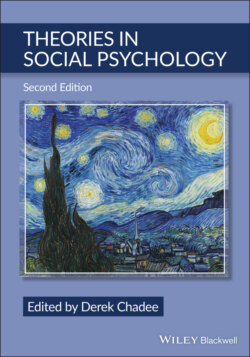Читать книгу Theories in Social Psychology - Группа авторов - Страница 11
Assumptions
ОглавлениеThe theory of psychological reactance attempts to explain people’s reactions to a perceived or actual threat to loss of their freedom(s). The concept of freedom is defined “as a belief that one can engage in a particular behavior” (Brehm & Brehm, 1981, p. 35). Brehm (1966, p. 9) defines “psychological reactance as a motivational state directed toward the reestablishment of the free behaviors which have been eliminated or threatened with elimination.” The theory makes no assumption about psychological reactance being aroused to acquire a freedom but refers solely to reinstating a threatened or eliminated freedom (Brehm & Brehm, 1981). Psychological reactance, therefore, arouses an individual and motivates toward restoration of freedom. As Miron and Brehm (2006) point out, reactance is not a proactive force but is reactive to actual or perceived threats toward freedoms.
The theory makes a number of assumptions about human behavior. Brehm (1966, p. 1) notes the following about human behavior: First, freedom of behavior is pervasive. Second, it is an essential aspect of human interaction and living. Third, human beings are goal-oriented and incessantly reflect on themselves and the external environment in assessing what, how, and when they will undertake particular behaviors. He states: “They consider their wants and needs, the dangers and benefits available in their surroundings, and the ways in which they can accomplish various ends” (1966, p. 1).
Many times people undertake behaviors when they are not fully aware of the rationale that drives the behaviors. At other times behaviors are performed while they are fully aware of constraints and lack of freedom in the performance of the behaviors. As a fourth assumption, however, Brehm assumes that most of the time human beings feel relatively free to participate in a range of behaviors.
Fifth, the theory assumes that people engage in or intend to engage in a set of behaviors. These behaviors have been engaged in in the past, are engaged in in the present, and will be engaged in in the future. He refers to such behaviors as the individual’s “free behaviors” and identifies a number of criteria to define a behavior as a free behavior. These include the behaviors being practically achievable, the individual having the physical and psychological capacity to engage in these behaviors, and individuals also being fully cognizant that they can participate in these behaviors. Such awareness of engagement emerges from social norms, customs, legislations, and other kinds of formal agreement and informal interaction. Worchel (2004) elaborates on how particular actions over time are perceived as free behavior. For reactance to occur, an individual must believe in the possession (perceived or actual) of a freedom (Miron & Brehm, 2006). A threat to this freedom creates the arousal – psychological reactance.
